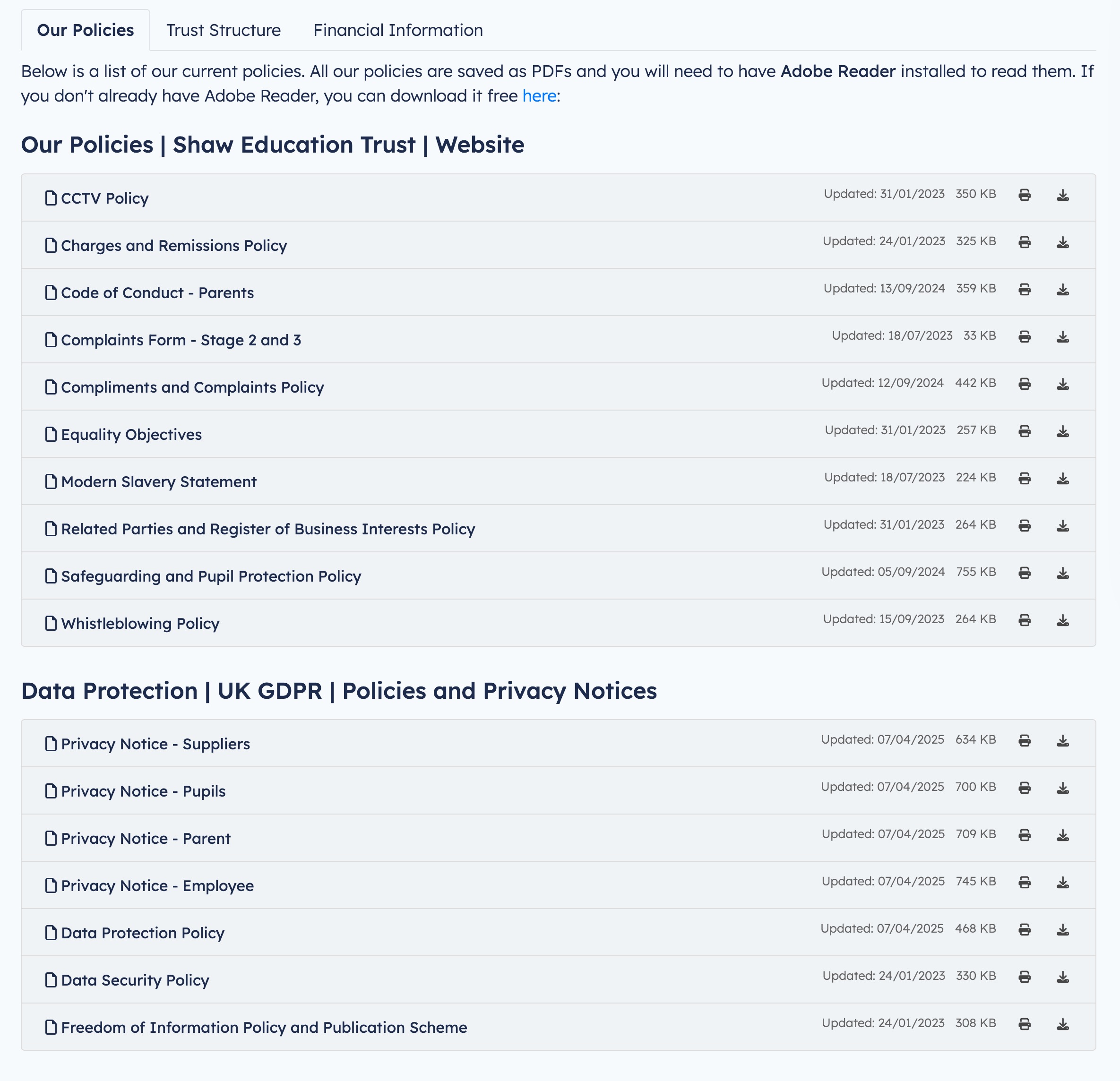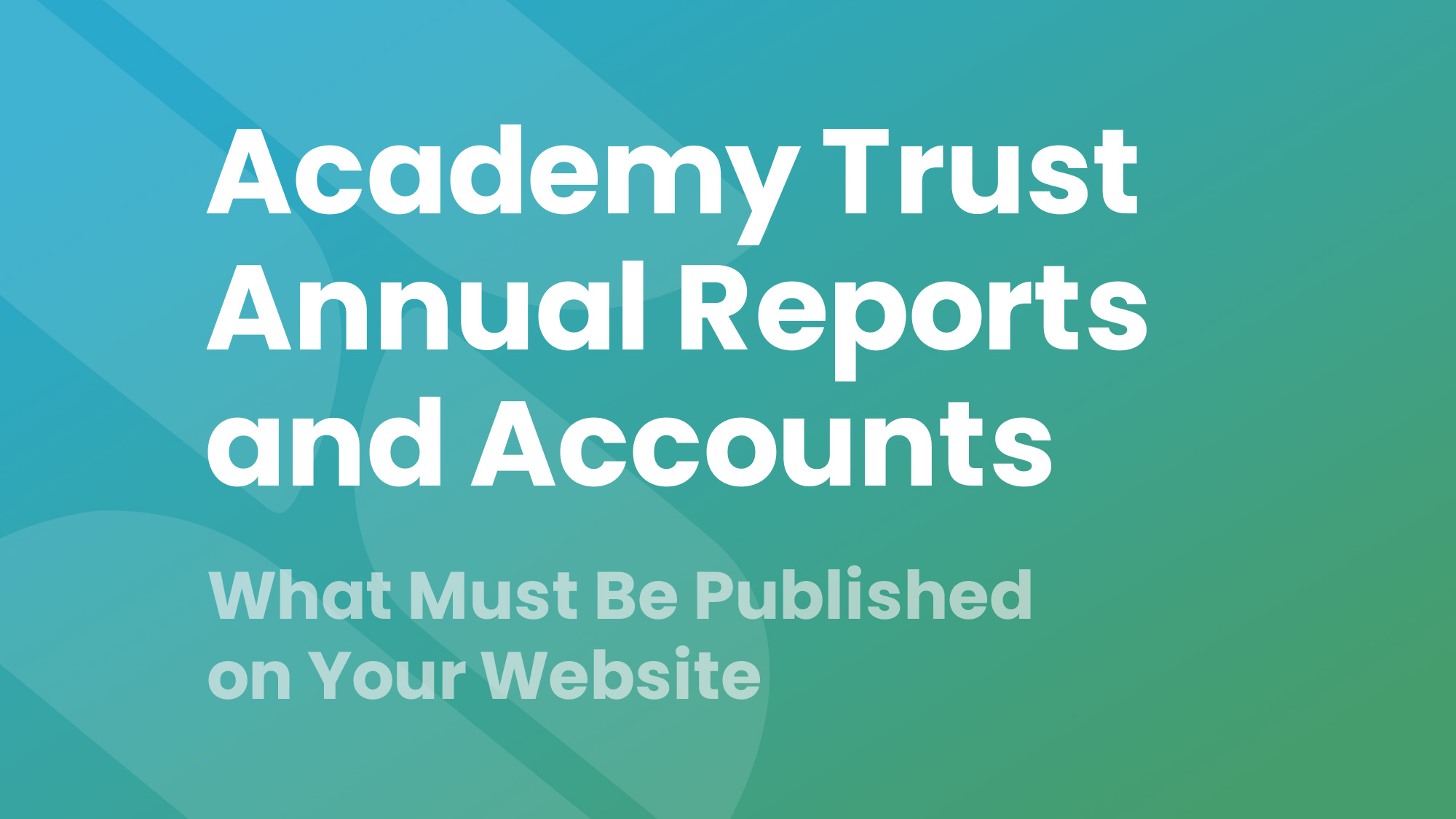Presenting Statutory policies for schools
Presenting Statutory policies for schools

If you’re responsible for managing and publishing the correct statutory policies for schools on your website, you might feel that it’s a mammoth task. Keeping on top it can be daunting. Let’s just take a step back, look through the best places to get the right information and figure out how to get things in place to ensure you’re meeting the latest school website requirements.
The department (DfE) provides governance guides and model policies to help schools and academy trusts. These resources are designed to support compliance and good governance, but model policies should be adapted to fit your individual school’s needs rather than adopted wholesale without modification. The government sets statutory requirements and provides the framework within which governing bodies operate, including setting schedules for policy reviews.
Our aim through this article, is to point you in the direction of the best statutory policies for schools advice, including governance guides and model policies as valuable resources. Then, we want to let you loose to get on with it.
Introduction to Statutory Policies
Statutory policies are the backbone of compliance for all maintained schools, academies, and free schools. These essential documents ensure that schools and academies meet all relevant statutory requirements set out by the Department for Education (DfE). Governing bodies are responsible for reviewing, approving, and implementing statutory policies, making sure that every policy reflects the latest statutory guidance and best practice.
The DfE provides comprehensive governance guides and model policies to help schools and academies develop and maintain compliant policies. These resources cover a wide range of areas, including child protection, health and safety, and accessibility, ensuring that every aspect of school life is supported by clear, up-to-date procedures.
To remain compliant, governing bodies must review statutory policies annually, unless a different review cycle is specified in the relevant statutory guidance. Policies must be readily accessible to parents, staff, and the wider community—often by publishing details directly on the school’s website. This transparency not only supports compliance but also builds trust with parents and the local community.
In some cases, the governing body may delegate the approval of certain policies to a committee or individual governor, but ultimate responsibility for compliance always rests with the governing body. By keeping statutory policies current and accessible, schools and academies demonstrate their commitment to high standards of governance, safeguarding, and education.
What are the statutory policies for maintained schools?
The checklist of statutory policies for schools changes roughly 2 to 3 times a year. DfE release changes and publish them on their website. These changes are often driven by new legislation and law, and schools must ensure compliance with all relevant statutory requirements. That’s not the whole story though. The main statutory policies page doesn’t always list all requirements or all policy documents. Governing bodies are also required to maintain other documents, such as additional policies and records, to ensure comprehensive compliance with statutory obligations.
Schools and academies are expected to publish a summary of their statutory policies online. So, one of the changes might not be listed as a ‘what schools must publish online’ requirement. However, it could still be published on their website and merely noted that schools should publish that information on their website! It’s not always very helpful.
One example is safeguarding or admission. Until recently, safeguarding wasn’t listed on the ‘checklist’. However, you still had to publish this information on your website. Isn’t that confusing? That’s why some expert input can be really useful.
When considering who must comply, local authority maintained schools and academy trusts both have specific obligations under education law. These requirements apply to all schools and academies, and it is important to stay up to date with statutory education policies and guidance.
Where can I get a list of all statutory policies for schools?
Lots of companies, school website and others, publish lists of requirements. Some are really good at keeping their checklists up to date but others aren’t. I would suggest a multi-pronged approach that covers you effectively. That means not relying on any single source of information. Choose a handful of respected resources and make them your go to assets.

Schudio provides the most comprehensive and trusted resource, downloaded 1000s times every year by schools across the UK. You can download your copy of the latest School Website Requirements Guide here.
Our goals is to take the hard work and stress out of getting at the right information, and know how to apply it.
If you undertake this yourself, your list might look like this;
- What maintained schools must publish online (Gov website)
- What academies etc must publish online (Gov website)
- Your Local Authority / MAT Resources
- Governor Information Subscriptions
But, bear in mind that you’ll also need to pull in information from resources like the Academies Handbook and apply nuances relevant to your setting.
Many of these resources provide model policy templates and comprehensive lists of required policies and procedures for schools and academies. These lists often include policy documents covering areas such as maintenance and health, which are essential for compliance. The most important thing to remember is not to rely on a single source of information. It is essential that a governing bodies review of policy documents takes place regularly—ideally annually—to ensure compliance and effective management.
Governing bodies must review and approve these documents, and may delegate or decide how often to review them, but regular governing bodies review is strongly advised to keep policies and procedures up to date and compliant with statutory requirements.
Health and Safety: Ensuring a Safe School Environment
Health and safety is a fundamental statutory requirement for all schools and academies. Every maintained school, voluntary controlled school, voluntary aided school, and academy must have robust health and safety policies and procedures in place to protect pupils, staff, and visitors. This includes clear arrangements for first aid, managing accidents and incidents, and responding to emergencies.
The governing body is responsible for ensuring that the school’s health and safety policy is reviewed annually and updated as needed to remain compliant with the Health and Safety at Work etc. Act 1974 and other relevant legislation. Local authorities often provide additional guidance and support to maintained schools, helping them interpret and implement statutory requirements effectively.
Health and safety policies must also reflect the public sector equality duty, ensuring that all procedures are inclusive and accessible for every member of the school community. The Department for Education offers model policies and practical guidance on risk assessment, helping schools and academies create safe, supportive environments for learning.
By regularly reviewing health and safety policies and making them readily accessible, schools demonstrate their commitment to the welfare of pupils and staff, and ensure compliance with all statutory requirements.
Governance and Management: Leadership Responsibilities
Strong governance and effective management are at the heart of every successful school. Governing bodies in maintained schools, academies, and free schools are responsible for setting the strategic direction of the school and ensuring compliance with all statutory requirements, including the adoption and review of statutory policies and procedures.
A clear governance structure is essential, with defined roles such as chair of governors, clerk, and relevant committees. The governing body must review and approve key policies—such as the child protection policy and safer recruitment procedures—ensuring they are implemented effectively and reviewed annually or as required by statutory guidance.
Governing bodies must also be aware of their responsibilities under the Equality Act 2010 and the public sector equality duty, ensuring that all policies promote equality and inclusion. The Department for Education provides governance guides and model policies to support schools and academies in meeting these obligations.
By maintaining a strong focus on governance, leadership teams can ensure that all statutory policies are compliant, up to date, and support the school’s mission to provide a safe, inclusive, and high-quality education for all pupils.
Child Protection: A Core Statutory Policy
Child protection is one of the most crucial statutory policies for all schools, including maintained schools, academies, and free schools. Every school must have a robust child protection policy in place that clearly outlines the procedures for safeguarding children and promoting their well-being. Governing bodies are responsible for ensuring that this policy is reviewed annually and updated whenever necessary, so it always reflects the latest statutory guidance and non statutory guidance.
To meet statutory requirements, the child protection policy must be readily accessible to parents, staff, and the wider community. Schools must publish details of their child protection policy on their website, making it easy for anyone to find information on how to report concerns or allegations. This transparency is essential for building trust and demonstrating a school’s commitment to safeguarding.
The policy should be fully compliant with the public sector equality duty and include clear equality objectives, ensuring that all children are protected regardless of background. It must also set out procedures for safer recruitment, handling allegations against staff, and managing low-level concerns. Governing bodies should strongly advise parents and staff to report any concerns or allegations directly to the designated safeguarding lead, reinforcing a culture of vigilance and support.
Ultimately, the child protection policy is a key document that shows your school’s dedication to safeguarding and promoting the welfare of children. By keeping it up to date, compliant, and easily accessible, schools and governing bodies can provide reassurance to parents, staff, and the local community that children’s safety is always the top priority.
Single Central Record: Compliance Essentials
The single central record is a vital compliance document for all schools and academies, forming the foundation of safer recruitment and safeguarding practices. This record must include comprehensive details of all staff and volunteers, including qualifications, training, and the results of all required suitability checks.
Governing bodies are responsible for ensuring that the single central record is accurate, up to date, and reviewed annually. Schools must have clear procedures for maintaining this record, including regular checks and updates whenever new staff or volunteers join the school.
The Department for Education provides detailed guidance and model policies on maintaining the single central record, as well as on safer recruitment and handling allegations against staff. Schools and academies must also have robust procedures for investigating and responding to any allegations, ensuring that all statutory requirements are met.
By keeping the single central record current and compliant, schools demonstrate their commitment to safeguarding, safer recruitment, and the highest standards of governance. This not only protects pupils and staff but also provides assurance to parents, governing bodies, and the wider community.
Data Protection and Privacy in Schools
Data protection and privacy are essential statutory requirements for all schools, whether you’re part of a maintained school, academy, or free school. Schools must comply with the General Data Protection Regulation (GDPR) and the Data Protection Act 2018, ensuring that personal data is handled lawfully and securely.
Governing bodies are responsible for making sure that a comprehensive data protection policy is in place. This policy should outline clear procedures for collecting, storing, and sharing personal data, as well as steps to take in the event of a data breach. It’s also vital to have a privacy notice that informs pupils, parents, and staff about how their personal data is used and protected.
The data protection policy should be reviewed annually and updated as needed to remain compliant with statutory requirements. Governing bodies must also ensure that schools have effective procedures for handling subject access requests and managing complaints related to data protection. Staff should be strongly advised to handle all personal data with care and to report any data breaches immediately to the designated data protection officer.
Having a clear, up-to-date data protection policy demonstrates your school’s commitment to safeguarding the privacy of pupils, parents, and staff. For further information and detailed guidance, schools can refer to the Information Commissioner’s Office (ICO) website, which provides comprehensive resources to help schools and governing boards stay compliant and protect everyone’s data.
What’s the best way to manage & present statutory policies for schools?
Do you know that you have to present some statutory policies on your school website in a specific way? Documents around governance need to be added in a “readily accessible” format. This includes all relevant statutory policy documents, such as first aid and health needs policies. That means, if a user has to download a file (even a pdf) and have software to open that file, it is not readily accessible.
How do you solve that? Your website provider should be able to provide a solution to this problem. Schudio offer a solution through a unique feature called ‘Document Groups‘.
By creating groups of documents (see where we got the name Document Groups from?), you can quickly and easily manage your school policies and other policy documents. The process is so simple; create a group, add your documents, set expiry dates and drop them on your website. The software will send you a notification when your policy needs reviewing. Then, when you update the document to the latest policy, the software will update that right across your website. You don’t need to remember where you’ve put a document because the software drops the correct documents into the correct place for you. Following policies and ensuring compliance with relevant statutory requirements is essential for all schools, especially when managing documents such as first aid, health needs, and safeguarding.
Primary schools must ensure that all policies are updated and accessible throughout the academic year to remain compliant and support the needs of their pupils. Statutory policies and procedures should be implemented as children enter primary school, typically around age 5, to support their transition and ensure compliance from the start of their education.
The policies are also displayed right within the content of the page as well. That means that no matter what device your policy is being viewed on, it is fully, readily accessible. More importantly, it’s compliant by nature.
How can I keep on top of all statutory policies for schools all year round?
Keeping up with the ever-changing statutory policies for schools can feel overwhelming. That’s why we offer the most trusted school website requirements guide in the UK, available here: School Website Requirements Guide.
Downloaded thousands of times each year, this guide takes all the hassle out of tracking, understanding, and planning for updates to statutory policies.
Instead of juggling multiple resources and trying to decipher changes yourself, our guide provides clear, up-to-date information on all the latest requirements. Plus, our compliance software supports governing bodies by simplifying the review and approval of policy documents. It continuously monitors changes to model policies and procedures, ensuring your school stays fully compliant without the extra workload.
By using our trusted guide and tools, you can confidently manage statutory policies related to aid, education, safeguarding, and more—making sure your school meets all statutory requirements with ease.










